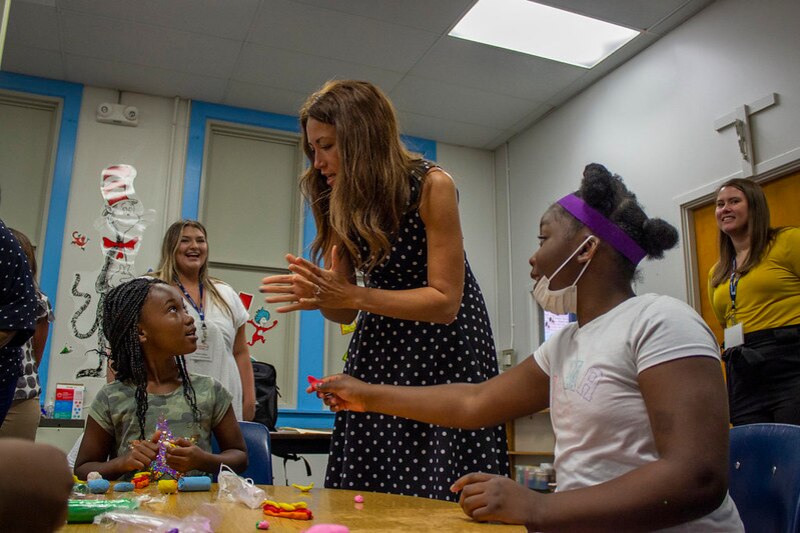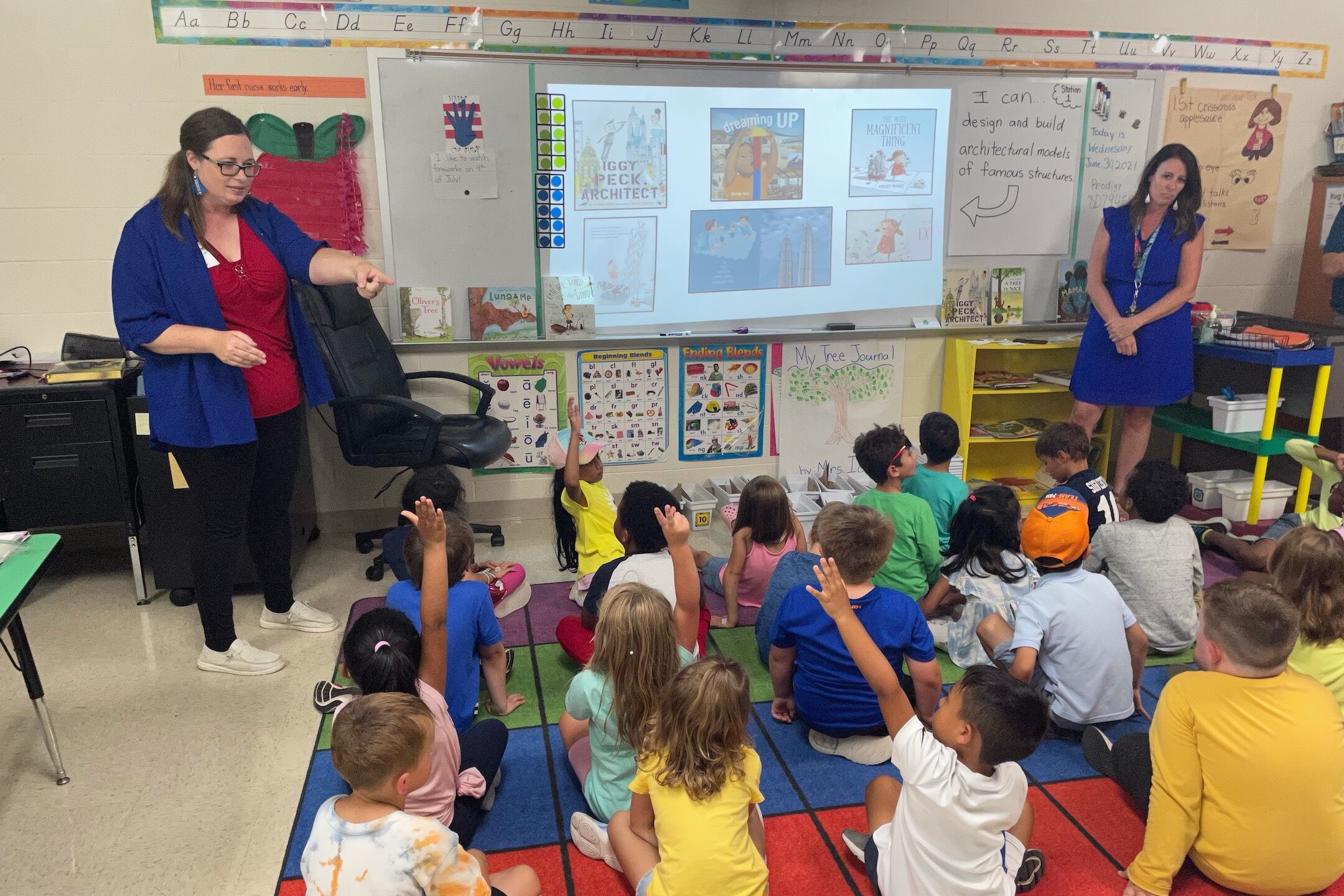Tennessee bet big that tutoring and summer programs would help students rebound quicker from the pandemic’s crushing blow to learning, but the results of the latest national tests don’t indicate an immediate payoff.
Mirroring unprecedented national declines in achievement, the state’s students slid back between 2019 and 2022 on math and reading exams in the fourth and eighth grades, according to data released Monday in what’s called the “nation’s report card.”
Based on results from the National Assessment of Education Progress, or NAEP, Tennessee’s slide was part of the nation’s largest math decline on record.
But perhaps more disappointing was the state’s performance in reading, with scores falling several points more than the national slide. Tennessee is prioritizing literacy and is overhauling how it teaches students to read, including a greater emphasis on phonics. And under a rigorous new third-grade retention law, it’s poised to hold back more students who don’t score as reading on grade level on state tests next spring.
The drops on this year’s national scores generally returned Tennessee to its lowest NAEP performance in math and reading since 2011, before outsize gains on the 2013 exam earned it the title as the nation’s fastest improving state.
Also, under a special assessment program in which NAEP administers tests in 26 big-city school systems, Memphis-Shelby County Schools was the only district to record among the top five declines on every test. No other Tennessee district participated in that voluntary assessment program.
Some regression in student performance had been expected in most every state after COVID-19 shuttered school buildings in the spring of 2020 and forced educators and students to toggle back and forth to other modes of learning for the next two-plus years.
But Tennessee acted early and aggressively to blunt the pandemic’s impact on learning — beginning with summer camps in every school district in 2021 — and had hoped to at least hold steady on this year’s state and national tests.
Last school year, Tennessee launched a three-year tutoring project to provide frequent, in-person, small-group help for students who were struggling in either math or reading. Federal relief funding covered much of the cost, with more than half of the state’s districts participating in the tutoring initiative.
Gov. Bill Lee also pushed to get students back into brick-and-mortar classrooms beginning with the 2020-21 school year. That drive turned out to be important, because states where schools more fully offered in-person instruction tended to see somewhat smaller declines in math and fourth-grade reading, according to a Chalkbeat analysis of the national data.
“If there’s any state with a chance at doing decently on this exam, I think it’s Tennessee,” Mike Petrilli, president of the Thomas B. Fordham Institute, told Chalkbeat last week before the scores were released.
“But of course,” he added, “NAEP serves as a great audit to see whether that is the case or not.”
It was not.
No state improved in math
In fourth-grade math, where Tennessee has generally kept pace with national averages since 2013, the state was down 3 points on a 500-point scale from 2019. But that was still better than this year’s 5-point national decline and double-digit drops in New York, Maryland, Virginia, and Delaware.
Still, 10 states managed to hold steady in fourth-grade math, including neighboring Alabama, Georgia, South Carolina, and Louisiana.
In eighth-grade math, Tennessee’s score dropped by 8 points, the same as the national average decline. Utah was the only state to show no significant change in that category.
Reading scores also took a hit
In fourth-grade reading, Tennessee fell 5 points from 2019, compared with the national drop of 3 points.
No state increased its fourth-grade reading score, while 30 states nationally and nine in the South saw a decline. Alabama, Arkansas, Georgia, and Mississippi saw no significant change, which was a victory of sorts for those states bordering Tennessee.
In eighth-grade reading, Tennessee dropped 5 points, compared with a 3-point national decline. The slump marked a return to the lowest performance in that category since 2003 for Tennessee, one of 33 states nationally and 11 in the South that saw a decrease. Among border states, Alabama, Georgia, and Virginia saw no clear changes in their scores.
Racial disparities show up in results
The declines showed how acute the learning loss has been, particularly for students of color, whose communities were hit especially hard from the physical, social, economic, and political consequences of COVID.
In fourth-grade math, except for a slight uptick from Hispanics and English language learners and improvement from rural students, all student groups showed declines, particularly Black students, whose average score went down 12 points, compared with a 2-point drop for white students.
In eighth-grade math, students with disabilities were the only group to hold steady, and the average score dropped by 15 points for English language learners, 10 points for Black students, and 8 points for Hispanic students. The average drop for white students was 6 points.
In fourth-grade reading, the average score of Hispanic students and English language learners rose by 4 points, while Black students saw their score go down 11 points, compared with 5 points for white students.
And in eighth-grade reading, rural students held steady, but performance was down for all other student groups, particularly English language learners.
Tennessee’s education chief, Penny Schwinn, was especially concerned about the performance of the state’s Black students, whose score decline doubled the national average.
“If we don’t address this with some level of urgency, then shame on us,” she told Chalkbeat on Friday, before the scores were released. “These are students who absolutely can be successful. They need additional supports, and we need to double down on what we’re providing them.”

That, she said, means making sure that struggling Black students, particularly Black males, are participating in the state’s tutoring programs — and that the quality of the tutoring is high.
“We can’t just check the box and think that it will magically work,” she said. “It’s not just the intervention; it’s the quality of intervention.”
What is NAEP?
Not every Tennessee fourth-grader or eighth-grader took the national test when the federal government administered the exams in early 2022.
NAEP tests a nationally representative sample of students in every state. The results, published as the nation’s report card, allow comparisons across states and are an important marker for showing how students are doing over time. The national test is also helpful because, unlike state tests that vary widely and change frequently, it’s essentially the same test every time and has been administered for decades to provide long-term data.
Normally, NAEP is given every two years, but federal officials postponed the 2021 exam because COVID was still rampant. Now, the results from 2019 to 2022 provide an especially helpful comparison of what students knew before the deadly respiratory virus hit — and what they knew two years into the pandemic.
“The results show the profound toll on student learning during the pandemic, as the size and scope of the declines are the largest ever in mathematics,” said Peggy G. Carr, commissioner of the National Center for Education Statistics.
NAEP counters Tennessee’s upbeat state test results
Tennessee’s grim performance on the national test comes just months after state officials reported that the most recent scores on state tests improved across all subjects and grades, largely returning to pre-COVID levels, except in math.
Petrilli, of the right-leaning Fordham Institute, said there are valid reasons for inconsistencies between state and national test results. For instance, state tests are more closely aligned to state academic standards and the curriculum taught in a state’s classrooms.
But NAEP also serves as an important external check on state testing and reporting systems, he said.
“Tennessee’s ed department was sounding awfully cheerful in June about state test results,” Petrilli said. “If that’s not what NAEP shows, the public should understand that it may not be as bad as it could have been — but it’s still bad.”
He hopes this year’s NAEP results serve as a gut check for educators, policymakers, and parents.
“It’s concerning when surveys show that most parents don’t think their kids are behind now, because that’s just not true,” Petrilli said. “The majority of American kids were already behind before the pandemic in terms of being ready for college and career, and now they’re further behind. So we do not need more happy talk. We need honest talk.
“We do not need more happy talk. We need honest talk.” —Mike Petrilli, President, Thomas B. Fordham Institute
“Parents should be advocating for their kids to get the extra help they need,” he said.
Schwinn said she stands by the results from state tests, which were taken by most of Tennessee’s nearly 1 million public school students this spring, as opposed to NAEP’s representative sampling of fewer than 10,000 students several months earlier — before the state’s high-dosage tutoring program began in earnest at scale.
“Frankly, I’d be pretty unhappy if we did not see a difference between January NAEP and our end-of-the-school-year state assessment,” she said.
A referendum on tutoring and summer camps?
Despite Tennessee’s disappointing NAEP results, state and federal officials remain bullish on strategies like tutoring and extended-learning programs.
Schwinn said it’s too early to see the impact of those interventions, as well as of the state’s reading overhaul.
“We picked research-based interventions,” she said, “and we’ve gotten these programs to a scale that is significantly bigger than any other state I know of. But we started the vast majority of those interventions at the same time this (NAEP) test was taken. So for me, this test will serve as a great baseline.”
U.S. Education Secretary Miguel Cardona also has encouraged states and schools to use federal COVID aid more effectively and expeditiously on strategies like high-dosage tutoring and after-school programs.
And research has shown that frequent in-school tutoring is one of the most effective ways to help students make academic progress.
Tennessee educators are on board, too. They’re thankful for any investments that help students succeed, according to the leader of the state’s largest teacher organization.
“You have to keep in mind that kids have struggled both academically and emotionally during this pandemic. Some didn’t have much social interaction for two years. Many have lost family members to COVID,” said Tanya Coats, president of the Tennessee Education Association.
“NAEP is about a single test on a single day,” Coats said, “but we’re talking about the whole child. Anything we can do to support the whole child, we’re all for that.”
To view the full report, visit the nation’s report card here.
Marta Aldrich is a senior correspondent and covers the statehouse for Chalkbeat Tennessee. Contact her at maldrich@chalkbeat.org.





